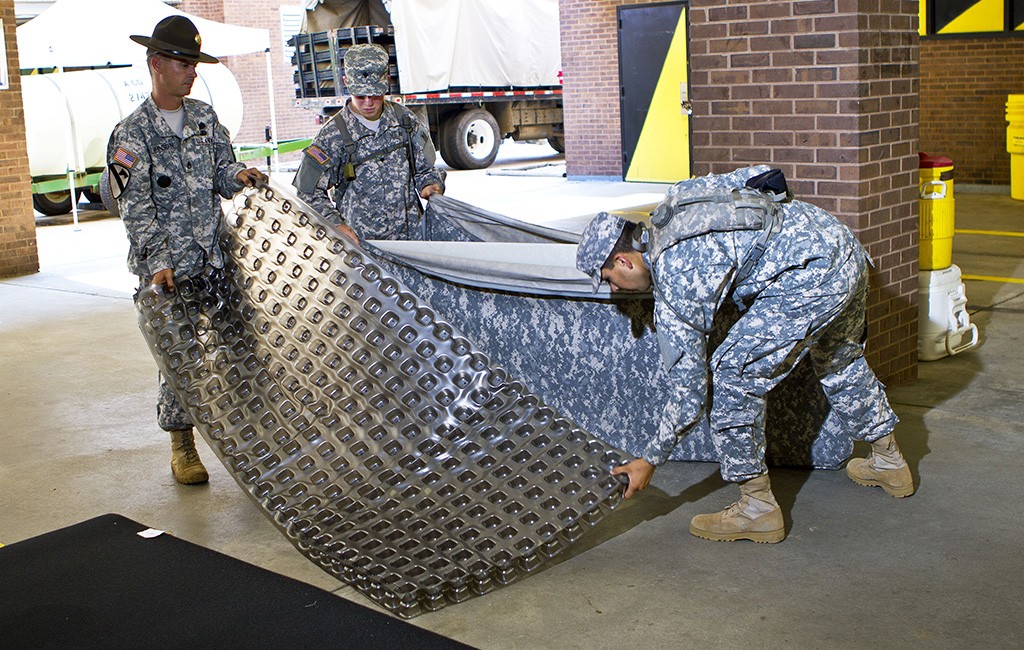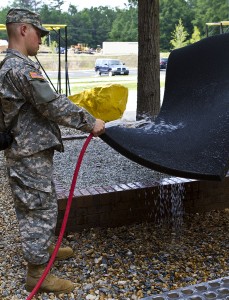When engineer Peter Foley took a new job at Skydex Technologies in 1999, he thought he had signed up to make running sneakers at a shop started by former Nike engineers.
But out of the gates, it was the military that came sprinting for Skydex’s door.
“The first group of people to call was the Marines,” said Foley, who is now the chief technology officer at Skydex.
Seventeen years and 74 patent applications later, Foley and his colleagues at Skydex have made plenty of Nike sneaker soles, but they’ve also designed flooring that can buffer the impact of roadside bombs in Iraq, mats that reduce injuries on Navy SEAL assault boats, and pads for NFL football helmets.
On Nov. 15, inventors at Skydex received their latest patent. It covers a mattress the company has been developing for the U.S. army over the past six years. Foley said the new product is durable enough for soldiers to clean and pass on to the next recruit rather than toss into a landfill.
“At the end of the training unit, one of the last things the guys do is take a mattress outside and hose them down,” Foley said.
The technology head said Skydex’s next challenge is developing cushions that work over repeated, long term use, but that can also absorb occasional shocks. Foley thinks that combination will gel well in places people sit for prolonged periods, like in a wheelchair or on the seat of a recreational vehicle.
Still, every time Skydex moves into a new vertical, it faces the same resistance.
“We have this saying: ‘No one’s going to get fired for using foam,’” Foley said. “The biggest challenge is getting people to understand things can be better.”
That realization – that things can be better – was what drove former Nike engineers Joseph Skaja and Martyn Shorten to patent Skydex’s initial shoe sole design in 1993.
Conventional foam dampens a blow with air bubbles that collapse upon impact. To absorb a more forceful shock with foam, the simplest solution is to make it thicker.
But instead of going thicker, Skydex designs materials with different bubble shapes and arranges them in different patterns to absorb and distribute the force of impact.
One early adopter was the maker of mine resistant military vehicles, which have been used heavily during military operations in Iraq and Afghanistan. The armored vehicles include Skydex decking under the seats to protect soldiers’ legs. Foley said Skydex products are in about 20,000 of the vehicles.
Another customer is a manufacturer of stadium wall pads. For years, the manufacturer had been adding inches to its vinyl-wrapped foam pads – but players kept getting injured. Skydex invented an alternative that prevents a sprinting outfielder from breaking his collar bone.
Skydex and its 32 full-time employees are based in a 22,000-square-foot headquarters in Centennial, which includes research and development and manufacturing space. The business is profitable, but Foley declined to quote sales figures.
The company also has a few products available directly for consumers, including knee pads, a dog bed and even their own line of Skydex sneakers.
When engineer Peter Foley took a new job at Skydex Technologies in 1999, he thought he had signed up to make running sneakers at a shop started by former Nike engineers.
But out of the gates, it was the military that came sprinting for Skydex’s door.
“The first group of people to call was the Marines,” said Foley, who is now the chief technology officer at Skydex.
Seventeen years and 74 patent applications later, Foley and his colleagues at Skydex have made plenty of Nike sneaker soles, but they’ve also designed flooring that can buffer the impact of roadside bombs in Iraq, mats that reduce injuries on Navy SEAL assault boats, and pads for NFL football helmets.
On Nov. 15, inventors at Skydex received their latest patent. It covers a mattress the company has been developing for the U.S. army over the past six years. Foley said the new product is durable enough for soldiers to clean and pass on to the next recruit rather than toss into a landfill.
“At the end of the training unit, one of the last things the guys do is take a mattress outside and hose them down,” Foley said.
The technology head said Skydex’s next challenge is developing cushions that work over repeated, long term use, but that can also absorb occasional shocks. Foley thinks that combination will gel well in places people sit for prolonged periods, like in a wheelchair or on the seat of a recreational vehicle.
Still, every time Skydex moves into a new vertical, it faces the same resistance.
“We have this saying: ‘No one’s going to get fired for using foam,’” Foley said. “The biggest challenge is getting people to understand things can be better.”
That realization – that things can be better – was what drove former Nike engineers Joseph Skaja and Martyn Shorten to patent Skydex’s initial shoe sole design in 1993.
Conventional foam dampens a blow with air bubbles that collapse upon impact. To absorb a more forceful shock with foam, the simplest solution is to make it thicker.
But instead of going thicker, Skydex designs materials with different bubble shapes and arranges them in different patterns to absorb and distribute the force of impact.
One early adopter was the maker of mine resistant military vehicles, which have been used heavily during military operations in Iraq and Afghanistan. The armored vehicles include Skydex decking under the seats to protect soldiers’ legs. Foley said Skydex products are in about 20,000 of the vehicles.
Another customer is a manufacturer of stadium wall pads. For years, the manufacturer had been adding inches to its vinyl-wrapped foam pads – but players kept getting injured. Skydex invented an alternative that prevents a sprinting outfielder from breaking his collar bone.
Skydex and its 32 full-time employees are based in a 22,000-square-foot headquarters in Centennial, which includes research and development and manufacturing space. The business is profitable, but Foley declined to quote sales figures.
The company also has a few products available directly for consumers, including knee pads, a dog bed and even their own line of Skydex sneakers.




Leave a Reply